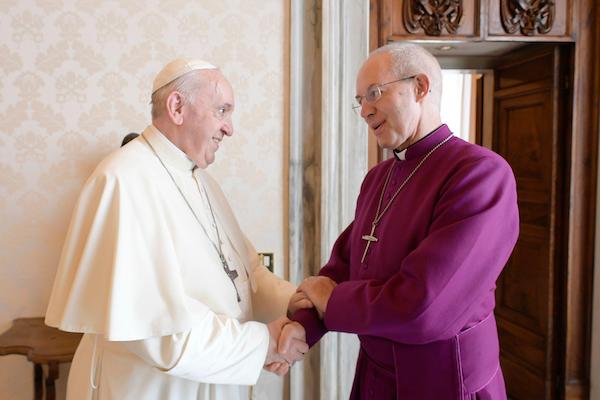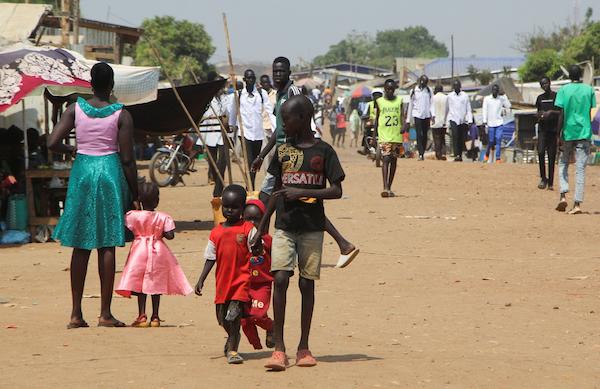Pope Francis is set to embark on one of the boldest trips of his pontificate when he travels to sub-Saharan Africa this week for a peace mission to the Democratic Republic of Congo and South Sudan.
Both countries have suffered from long-running internal conflicts that have claimed hundreds of thousands of lives, and both are places where the Church plays a crucial role in working for peace and providing education and health care.
The Pope’s ecumenical pilgrimage to South Sudan is unprecedented as it will be undertaken jointly with the Archbishop of Canterbury and the Moderator of the General Assembly of the Church of Scotland.
While in Juba, the 86-year-old Roman Pontiff, the Archbishop and the Moderator are likely to challenge the country’s leaders to implement the country’s fragile peace process.
The ecumenical pilgrimage to South Sudan comes almost four years after a retreat for the country's political leaders in the Vatican led by Archbishop Justin Welby.
At the end of the retreat, Francis made a dramatic appeal for peace by kneeling to kiss the leaders’ feet. But many observers say that President Salva Kiir, a Catholic, and Vice-President Riek Machar, a Presbyterian, must do more to deliver peace in the world’s youngest country.
Around 400,000 people have been killed in South Sudan, and more than two million displaced in a civil war that has ravaged the country on and off since South Sudan declared independence in 2011.
On top of the conflict, the east African country has suffered an unprecedented four years of flooding and food insecurity.
Pope Francis and his fellow Church leaders are likely to lay down a challenge to South Sudan’s political leaders.
“I think that the words that the Pope will address to all the political leadership in South Sudan will be very demanding. He will have strong words to say to them,” Archbishop Paul Gallagher, the Holy See’s Secretary for Relations with States (Foreign Minister), told a webinar with The Tablet ahead of the visit.
|
Pope Francis’ visit to the Democratic Republic of Congo and his ecumenical pilgrimage to South Sudan are powerful examples of the role faith can play in peace building. In an historic first, Francis will be joined in South Sudan by the Archbishop of Canterbury and the Moderator of the General Assembly of the Church of Scotland. In this podcast, Christopher Lamb, The Tablet’s Rome Correspondent, spoke to Archbishop Paul Gallagher, the Holy See’s Secretary for Relations with States (foreign minister), Bishop Precious Omuku, the Archbishop of Canterbury's Special Representative on Conflict in sub Saharan Africa at Lambeth Palace and Dr Iain Greenshields, Moderator of the General Assembly of the Church of Scotland and a representative of the Archbishop of Canterbury, about the trip.
|
“He will be, above all, trying to articulate the voice of the people, which I think many political observers would say, in criticism of the political leadership in South Sudan, they are not sufficiently attentive to.
“They are not listening to their own people. They are not feeling all the sufferings of the people which we know have been great historically and in these last years and which sadly even in recent months have been quite extreme.”
The archbishop, who is among those travelling with the Pope on the visit and has assisted with its preparation, said that while there will be an “uncompromising challenge” from the Pope it will be “put in ways of encouragement”.
He stressed it was important for the West not to adopt a “patronising approach” to the peoples of Africa and imagine that “we are completely different”.
The archbishop said that tribalism – often cited as the root cause of problems in Africa – existed in the West but with “more elegant terminology” and that “we have our conflicts as well”.
Archbishop Gallagher said the Pope would communicate a message of “hope, reconciliation, and peace.”
Dr Iain Greenshields, the Church of Scotland moderator, told The Tablet webinar that the leaders would “speak truth to power”.
The aim of the visit, he said, was to provide “hope to the vast majority of people in South Sudan” so “they won’t be frustrated at the end of this process, but they will see that there is evidence that there is a change in heart and a change of direction”.
South Sudan’s churches have been closely involved with the country’s struggle for independence and have made peace-building central to their mission.
Francis’ visit with Archbishop Welby and Dr Greenshields reflects the cross-denominational collaboration within the South Sudan Council of Churches.
Bishop Precious Omuku, an adviser to the Archbishop of Canterbury on reconciliation, explained that the churches in the country have a “unique unity about them” and are an example to others as a place where “denomination doesn’t count too much”.
He pointed out that the council of churches had produced an Action Plan for Peace in the country.
Speaking ahead of the visit during his Sunday Angelus on 29 January, the Pope said he, the archbishop and the moderator would make an ecumenical pilgrimage as “brothers” to the country, while Archbishop Welby said that “after centuries of division, leaders of three different parts of the Church are coming together in an unprecedented way”.
When the Pope arrives in Juba, the archbishop and Dr Greenshields will board the plane to greet him. A spokesman for Archbishop Welby confirmed the archbishop would also join Francis on the flight back to Rome.
South Sudan has hardly known peace. From 1983 to 2005, it fought a war for independence with Sudan, and as part of the terms of the 2005 peace agreement, it held a referendum for independence.
In 2011 the new country was formed, but two years later a civil war broke out, although power-sharing agreements were brokered in 2018 and 2020. The fighting has been inter-ethnic, political and tribal.
Suzanne Jambo, a South Sudanese politician who ran for president in 2018 and worked on the 2005 peace process, is critical of the current political leadership.
Ms Jambo is the founder and chairperson of Steps, a political party that she says is mainly comprised of young people and women.
“President Kiir’s government has totally failed to deliver peace since his feet were kissed by the Pope in 2019,” she told The Tablet.
“We want the holy men of God visiting our suffering young nation to highlight the truth as written in the Bible. Our Christ the Saviour always spoke the truth and ordered us to do so. South Sudanese are suffering beyond human comprehension.”
She added: “We yearn for a just lasting peace in our bleeding nation.”
Before visiting South Sudan, the Pope will travel to the Democratic Republic of Congo, where the Church is an outspoken voice for peace and democracy.
It was heavily involved in mediating the 2016 St Sylvester peace accords, which sought to resolve a political, constitutional and social crisis and help form a government.
The Church is also a major provider of healthcare and education, and President Felix Tshisekedi recently turned to the Archbishop of Kinshasa, Cardinal Fridolin Ambongo, to lead the Covid-19 fund.
DR Congo is a vast country, roughly the size of Western Europe and with a population of over 100 million.
Around 50 per cent are Catholic, and when the Pope celebrates an open-air Mass at N’Dolo Airport on 1 February, 1.5 million people are expected to attend.
The country is rich in natural resources, including cobalt, an essential mineral for lithium batteries used in smartphones, laptops and electric vehicles, while the Congo basin is the second largest rainforest in the world.
Despite this, the majority of the population lives in poverty. The World Bank ranks the country as one of the five poorest in the world.
In 2015, the “Ecclesial Network of the Congo Basin Forest” (Rebac) was formed to speak out against threats to biodiversity including the six countries of equatorial forest: Cameroon, Gabon, Equatorial Guinea, Central African Republic, Republic of Congo, DR Congo.
It follows the example of a similar ecclesial network formed in the Amazon.
Francis is likely to call for an end to violence in the country. The fighting has claimed the lives of 6 million people from 1998-2008, making it the deadliest conflict since the Second World War.
Much of the conflict is in the country's east, where many of the mines are located and fought over by soldiers and traders from other countries.
A plan for the Pope to visit Goma in eastern DR Congo was scrapped due to security fears.
“The people of DRC have suffered so much loss. For over 30 years, we’ve had pain, heartbreak all caused by war,” said Bernard Balibno, who is the lead official for Cafod in the country.
“That is why the visit of Pope Francis is so important. It is a sign of great hope for my country.”
He continued: “His visit has already touched the hearts of so many. It gives us hope of peace and healing. Our people want peace, we cannot take any more suffering or war. I, along with so many in my country, hope the Holy Father’s visit will bring us toward the lasting people we deserve.”
Francis will be in DR Congo from 31 January to 3 February and in South Sudan from 3 February to 5 February.
This will be the Pope’s fortieth foreign trip of his papacy and his fifth to the African continent.
Christopher Lamb, The Tablet’s Rome Correspondent, is among the journalists onboard the papal plane with Pope Francis and will be filing regular reports on the visit.



 Loading ...
Loading ...